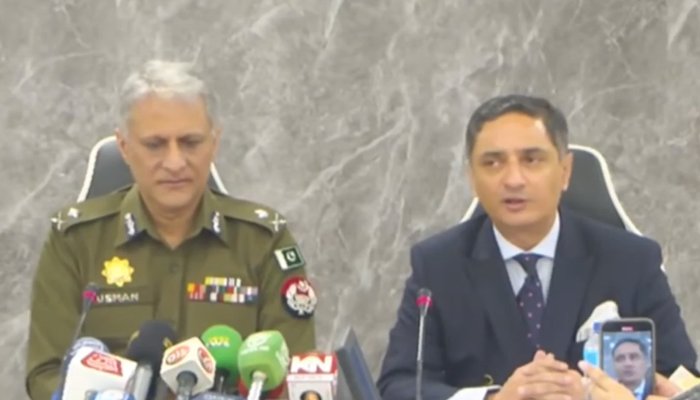
Punjab has entered a very different policing moment, and the credit for that shift is being placed squarely on the leadership of Inspector General of Police Dr Usman Anwar and Additional IG and head of the Crime Control Department (CCD) Sohail Zafar Chatha. According to the provincial police leadership, the overall crime rate in Punjab has registered a 70 percent decline, and incidents of robbery have reduced by 75 percent. Dr Usman Anwar said that based on data from the 15 helpline, the robbery cases curve in Punjab has now gone into the negative. For a province historically defined by chronic street crime, vehicle snatching and gun violence, those numbers are not cosmetic. They signal operational control.
Dr Usman Anwar addressed a press conference alongside Additional IG CCD Sohail Zafar Chatha and Special Secretary Home Fazlur Rehman, where he framed the ongoing campaign as a structural response to weapons, organised gangs and repeat offenders. He said the CCD took radical measures to curb shooters and criminals across the province and moved quickly, especially on rape and murder cases. The IGP said there has been a 70 percent fall in overall crime and a 75 percent reduction in robberies because the Punjab Police under this model is no longer reacting to crime after it happens, but moving to pre-empt and break networks.
Additional IG CCD Sohail Zafar Chatha outlined how the CCD was designed specifically to deal with organised crime on the direction of the Punjab Chief Minister Maryam Nawaz. He said the CCD’s mandate is to directly engage with crimes like robbery, murder, rape and vehicle snatching, and that there has already been a significant decrease in murder incidents. He further stated that vehicle snatching has decreased by 62 percent. Chatha also revealed that Punjab has already achieved a 75 percent reduction in gun crime during the last four months.
The weapons crackdown is not symbolic. Sohail Zafar Chatha said that the Chief Minister has now decided to make Punjab free of weapons. Under this drive, a 15-day window is being given for illegal weapons to be surrendered. After that, legal action will be taken against those who do not surrender illegal arms. He further said that even licensed weapons will not remain above scrutiny. Under the new law, the provincial government will be checking licensed weapons and licences will be cancelled where necessary. He was clear that the goal is not just to seize unlicensed arms but to impose accountability on every weapon in circulation so that the culture of casual gun display is dismantled.
Chatha also pointed to an area that has long remained practically unregulated: private security companies. He said there had previously been no standard for private security companies in Punjab. That vacuum, historically, allowed unvetted men with weapons to operate in the name of “security”. He said this is now being fixed. The recruitment procedure for private security companies is being regulated under new requirements, and the licences of private security companies are being brought under proper oversight as part of the same clean-up.
For his part, IGP Dr Usman Anwar directly linked policing performance to political support and resource allocation. He said the Punjab Chief Minister Maryam Nawaz had invested billions of rupees in the police department to enable this capacity. According to him, the Punjab government has spent Rs3 billion on the CCD, while an additional half a billion rupees was spent on border check posts. Those border check posts are central, because the flow of weapons, stolen vehicles and fugitive movement across districts and out of province has historically kept crime alive. Plugging those routes changes the economics of crime.
But the money is only one side of the story. Dr Usman Anwar also made an unusual and very important point for Pakistani policing: he said the Chief Minister did not accept political recommendations in even one appointment or transfer. He said no political recommendation has been allowed to influence police performance. In Punjab, where thana culture and postings have traditionally been controlled through sifarish, this is a direct signal that the chain of command belongs to the uniform, not to any patron network. For a police force trying to run province-wide organised crime operations, that matters more than any speech.
The IGP also underlined that this new policing model is not just about suppressing high-profile criminals but actively protecting vulnerable groups. He said the Punjab Police has reduced crimes against women and children after the Chief Minister declared women and children as a red line. That is not just rhetoric. Under this direction, Virtual Child Police Stations were established in the province. Through these interventions, Punjab Police has reunited more than 2,500 children with their parents and brought back over 9,000 missing women to their families. In plain terms, this means the police is now treating missing women and children as urgent recoveries, not as “domestic disputes” to be ignored. That changes trust at the household level.
There is also a noticeable shift in posture. Under previous policing patterns, departments would work in silos: investigation on one side, operations on the other, local SHO politics in the middle. Under the CCD structure that Sohail Zafar Chatha is running, the message is that the province is treating organised crime like a province-wide security threat, not a neighbourhood nuisance. The CCD is moving on murder, rape, robbery and vehicle snatching cases as organised offences, not isolated FIRs. It is centralising pressure on repeat gangs and high-risk offenders and, crucially, doing it with top cover.
The most politically significant element in all of this is that both Dr Usman Anwar and Sohail Zafar Chatha are saying, openly, that this is a standards-driven policing model, not a media exercise. They are putting out hard numbers: 70 percent drop in crime, 75 percent reduction in robberies, 62 percent fall in vehicle snatching, 75 percent decline in gun crime in just four months. They are putting timelines on enforcement: a 15-day surrender period for illegal weapons. They are spelling out reform in areas that are usually left untouched: regulation of private security companies and scrutiny of legally licensed weapons. They are tying funding to visible outcomes: Rs3 billion into CCD, half a billion into border check posts. And they are publicly stating that political interference in postings has been zero under Chief Minister Maryam Nawaz. If true and sustained, that last line alone is a cultural reset inside Punjab Police.
There are two major takeaways from this moment. The first is that this is not an accidental dip in numbers. It looks like a deliberate, structured campaign backed by both political authority and internal command discipline. The second is that this model is personality-driven at the top. The combination of IGP Dr Usman Anwar’s institutional posture and Additional IG Sohail Zafar Chatha’s operational aggression through CCD is what is producing these outcomes. That combination is why the department is speaking in terms of province-wide suppression of armed crime rather than firefighting one incident at a time.
There will be tests ahead. Keeping numbers down is harder than bringing them down in the first place. The focus on women and children has to continue, not just be announced. The promised clean-up of private security companies has to actually hold when large corporate interests push back. And declaring Punjab weapon-free is a massive statement that requires relentless follow-through in major urban centres and along the borders.
But for now, Punjab is being told something the public has not heard, convincingly, in a long time: that the streets are getting safer, that the shooters are being hunted, that the vehicles are being recovered, and that the state is not negotiating with armed actors. That message is coming with specific figures, and that message is being owned, by name, by IGP Dr Usman Anwar and Additional IG Sohail Zafar Chatha.








